
22 Cool Math Games for Kids: Fun Activities with Multiplication, Addition and Subtraction
Your kids like playing cards and dice, right? Well, with cool math games for kids you can literally play math into your children using for instance cards and dice.
Playing
fun math games for kids will transform math from a boring
work-like challenge into pure fun and games.
Taking a
playful approach to teaching children about math will not only be
more effective when it comes to learning it will definitely also be
a lot more pleasurable ... for you too.
On this fun math
games page you will get lots of inspiration and practical tips to
play everything from multiplication math games to math addition
games to math fraction games.
So hang on tight, this is
going to get fun! :-)
Why Fun Math Games for Kids Are Effective and in Sync with Your Kid's Brain
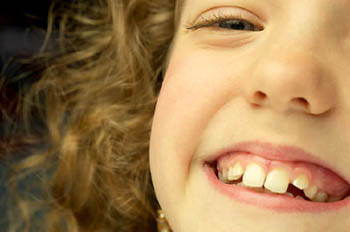 When it comes to teaching kids anything, games are most often the
way to go.
When it comes to teaching kids anything, games are most often the
way to go.
Think back to when you were a child: The things
that you remember most were the ones that you were actually
interested in, or that you enjoyed.
All the games that you
played with your parents or siblings were the ones that actually
helped to imprint things on your mind, and the same will be true for
your child.
Did you know that the mind can actually learn
things quicker when it is playing a game?
There are a few
reasons for this:
1. Games Usually Involve a Lot of Repetition
Seeing as how repetition is the law of memory, anything that you
repeat over and over is guaranteed to stick in your head very
effectively.
So playing fun math activities that force you
to repeat the same mathematical calculations over and over is
guaranteed to teach.
2. Games Are Always a Lot More Fun
Many kids have trouble sitting still and copying things from the
whiteboard, but turning traditional teaching into math games
for kids adds an element of fun to it. And fun is the driving force
behind most of children's activities - kids math games too.
3. Games Come in a Wide Variety
With learning math problems like addition and subtraction, there is
only one way to learn it.
However, practicing it can be done
in many forms, and this is where games have the edge.
The
games can involve everything from online zombie attacks, space
invaders to offline fun challenges with cards and dice that will
stimulate your child to practice their math.
Variety is the
spice of life, and it is what will help your child to learn their
math effectively.
As you can see, math games
are the best way to help your child learn his or her math, and it
will make it much more fun for your kids to learn - no matter how
challenging it is.
Using Cards when Playing Cool Math Games for Kids
One of the best ways that you can teach math for kids is by using
card games.
The playing cards are all based on numbers, and
you can play many games with cards that will help your child learn
his or her math.
There are so many cool math games for kids
you can play with cards, and you can also bend and twist the rules
to invent your own games.
Here are a 7 card games that you
can use to teach your kids math:
Two, Three or Four Card Indian Poker
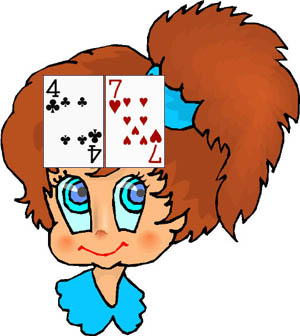 The game of Indian Poker involves each player holding a card face
out to his or her forehead. Everybody can see each other's cards
except his or her own.
The game of Indian Poker involves each player holding a card face
out to his or her forehead. Everybody can see each other's cards
except his or her own.
Then the betting starts and judging
from each other's cards people around the table have to say whether
they are "in" or "out". The ones that are "in" take down their cards
and the player with the highest card wins the round along with the
"in" players' betting.
In this math game for kids
variety, rather than holding a single card, have each player hold
two, or three or four cards to his or her head.
Each person
will have to do mental calculations (either just addition but
perhaps also multiplication if you want to make the game more
difficult) to determine who has the highest pair.
Uno with a Twist
Uno is a card game that focuses on numbers and colors, but it can be
a great game for smaller children with a twist added.
If a
Skip or Reverse is put down, treat it like the face cards in a
regular deck and put down two cards of equal value in order to avoid
the card.
It will take a bit of practice to get it right,
but it can be lots of fun once your children get the hang of it.
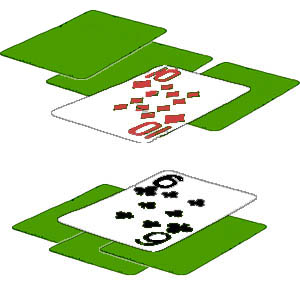 War
War
In the game of War, all of the cards are dealt out evenly to each
player, and all of the players turn over the top card in their hand.
The highest card wins the game, but a war is caused when two
or more of the highest cards are of equal value. Then each person
has to put three cards face down and one on top of them face up.
The one with the highest card wins all the cards involved in the
war.
The game continues until one of the players has lost
all cards.
With a few small changes, the game can be turned
into a math game.
Addition War
War is a game where the highest card wins, but what happens when
there are two cards of equal value?
With Addition War, the
war results in all three cards being placed face up, and the person
with the three highest cards wins the war.
Subtraction War
Subtraction War is a similar kind of kids math game, but
with a simple variation.
The three cards are placed face
down and the final card is placed face up.
However, each
player has to select one of the cards that are face down and
subtract the value of that card from the card that is face up.
The person with the highest score wins the war.
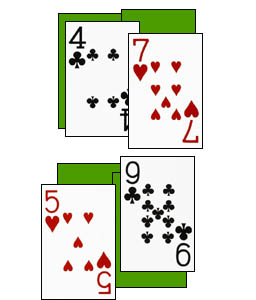 Multiplication War
Multiplication War
Multiplication War involves two cards being placed face down, and
two cards being placed face up.
The two face up cards are
multiplied to determine who wins the war.
In the example to the right 4 is multiplied by 7 and 5 by 9.
So as you can see there are many, many ways to spin War in cards - the only limit is your own imagination :-)
Blackjack
Blackjack can be used to teach your children addition, as well as
thinking quickly and doing mental calculations.
Each player
is given two cards - one face down and one face up.
The sum
of the cards are added together according to their values (number
cards are the value of the number, face cards are valued at 10, and
an Ace card is valued at either 1 or 11 as the player wishes).
Cards can be given to players as requested, but the total value
of their cards cannot pass 21. The person closest to 21 with the
fewest number of cards wins the game.
All of these cool math
games for kids are excellent for teaching your kids all about math,
and you will find that it will be much easier for them to learn
simple math skills if you use these great games to teach them.
Using Dice for Cool Math for Kids
Dice are also excellent to use to help your child learn math, and
there really is no end of games you can use to teach your children
math skills.
Here are a few ideas for fun math games for
kids for teaching math with dice:
Addition Addiction
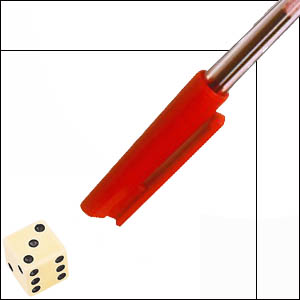 This game teaches your children to use their math speeds in their
head to quickly calculate sums.
This game teaches your children to use their math speeds in their
head to quickly calculate sums.
Hand each child a dice along
with a pen and a piece of paper.
Have each child roll their
dice at the same time.
Then each person has to add all the
numbers of all the dice together and every person has to note the
sum down on their piece of paper.
After ten of such rounds
everybody has to add together the 10 numbers on their paper.
It will be interesting to see if you can all the get same sum.
Subtraction Speed
Rather than adding the numbers together, have the person with the
highest dice subtract his or her number of points from each of the
other players.
Each player starts with 100 points, and the
last one to reach 0 wins the game.
An example: one gets a 6,
the two others get a 3 and 2. The person with 6 gets to subtract 6
from each of the other players which will leave them both at 94.
You can also add a variation on the game where the person with
the highest dice has to come up with a subtraction problem that the
other person has to answer or else lose a certain number of points.
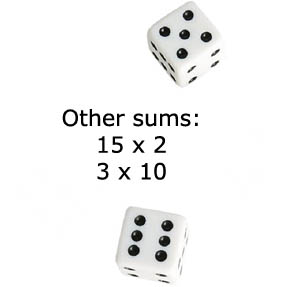 Multiplication Mystery
Multiplication Mystery
Divide the players into teams of two, and have each player roll
their dice.
Both players have to come up with other
multiplication problems that have the same product as the product of
their two dice, thus forcing them to practice their 1 through 6
times tables.
Consider using two dice each to have them
practice up to the 12 times tables.
Dice Rolling Action
Have your small child (ages 2 to 4) practice rolling the dice and
telling you what the number on the dice is.
Obviously this
game will get easier over time, but you can use many-sided dice (up
to D20) to help them practice understanding both numbers and dots.
Division Dice
Hand each player 4 dice, and have them take turns throwing all four
dice.
The player throwing the dice has to come up with a
result that involves the sum total of the four dice divided by one
of the numbers on the dice.
Some of the math games for
kids that you can
play with dice are pretty complicated, but you can bet your boots
that they will help your kids learn math like nothing else can!
Fun Math Games for Kids Online - for all Ages
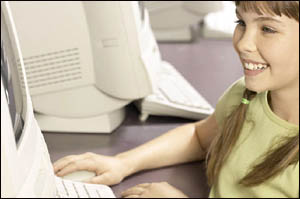 If you want variation to the above math games the
world of modern technology can also lend a helping hand.
If you want variation to the above math games the
world of modern technology can also lend a helping hand.
There are many online games and websites where they can find a
wealth of fun games to play.
Check out some of the sites
below:
CoolMath-Games is a site where your
child can find cool math games for kids of all ages.
There
are all kinds of games, such as puzzle games, strategy games, color
games, pictures games, logic games, and more, and these games can
all put your child's math skills to the test.
The wide
variety of games are all simple and easy for your computer to play,
making them a great choice no matter who you are!
Fun4TheBrain is a website where you can find a lot of Flash
animated games for your child, but these games are much more complex
and comprehensive.
Here you can have your child feed hungry
aliens, give reindeer cookies, recovering stolen leprechaun gold
from thieving crows, and so much more.
The wide variety of
games on this site is sure to capture your child's attention.
LearningGamesForKids is another excellent site
with all kinds of fun, simple kids math games that can help your
child learn mathematics.
They have games ranging from
kindergarten math games to 5th grade math, thus enabling your
children to practice their math skills no matter their age.
There are games in all categories, but the math games are some of
the most fun and educational on the site.
If your child is
hungry for math delivered in a fun way, it is definitely worth
checking out this website.
Still More Fun Math Games for Kids to Make Math Fun
Here are a few more fun math games for kids and fun math activities
you can try to help your child improve their math skills:
Coin Counting Math
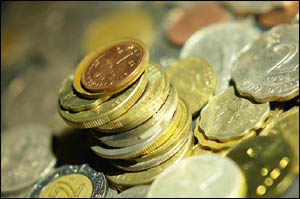 Using pennies, nickels, dimes, and quarters is a great way to teach
your children basic math skills, and you will find that there are
hundreds of variations of games that you can play with coins to
teach them.
Using pennies, nickels, dimes, and quarters is a great way to teach
your children basic math skills, and you will find that there are
hundreds of variations of games that you can play with coins to
teach them.
You can give them a penny and ask them how many
they need to make 15 cents, or you can give them dimes and tell them
to make change for a dollar and a half.
The point is to use
the money while creative coming up with math problems for your kids
to solve. In this way you can teach them basic math skills such as
division, addition, subtraction, multiplication and math logic.
Real Life Word Problems
Word problems may not seem like a lot of fun, but imagine giving
your children real life word problems that they have to figure out,
such as how many spoons of flour you need to add to your pie to
equal one cup.
Or how many dollars you need to buy a $10 item
with a $2.50 coupon, and on the list goes.
Word problems
don't have to be boring, and with this one of math game for
kids you can find ways to make them fun just by getting creative.
Store Owner Inside the Kitchen
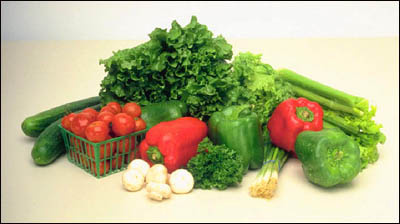 Teaching math through games can be a lot of fun,
and there is nothing more fun than having your kids go shopping for
you.
Teaching math through games can be a lot of fun,
and there is nothing more fun than having your kids go shopping for
you.
If you don't want them to do the weekly shopping with
you, have them run their own "store" inside your kitchen and use
Monopoly money to purchase the items you need for your meal.
You can use money to teach math, the number of grams in a
kilogram, the number of ounces in a pound or quart, and so much
more.
Giving the kids a chance to use their real life hands
on experience can make the math come alive to them.
Addition Poker
With poker, you have to find a combination of five cards that will
be advantageous, but addition poker requires them to get the
combination of five cards with the highest total value.
Kings are the highest at 13 points, followed by queens at 12, Jacks
at 11, the number cards at face value, and Aces at 1 point.
You can make any kind of variation on the game, playing Texas Hold
Em, 5 card stud, 7 card stud, or any other poker games to get them
to use their math skills.
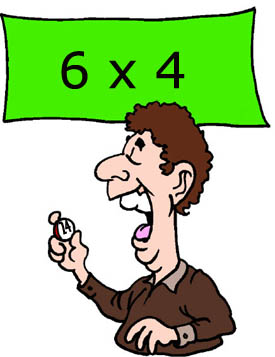 Math Bingo
Math Bingo
Bingo is a classic game that you can use to help your children learn
math in terms of multiplication math games.
You can get a
regular bingo set, but rather than calling out the numbers you will
call out mathematical equations that give them the number.
For example, say the number you draw is 24, you can call out "8
times 3", "6 times 4", "48 divided by 2", and on and on it goes.
The rules remain the same (the person to get five in a row first
wins), but it forces them to use their math skills to figure out
what number you have called.
Monopoly
Monopoly is a game that you can use to teach smaller children about
math, and the whole game is based on the economic system (numbers
and figures).
They have to count the numbers on the dice
that they roll, they have to count the number of spaces they move
their figure, they have to know how much money to give to buy a
property, and they have to give money to the owner of the property
they have landed on.
The whole game is based around math,
and this one of fun math activities is a good one to help them start
learning.
Connect Four
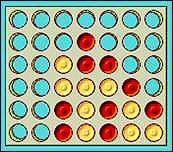 Connect Four is a game that requires kids to use their head, logic,
and math skills.
Connect Four is a game that requires kids to use their head, logic,
and math skills.
They can't just drop four of their markers
into the stand and hope they will fall in the right place, but they
will need to count how many markers to use in order to get the four
in a row.
As an example of cool math games, Connect
Four is the perfect combination of math skills and logic, and you
will find that it will help your children to develop their intellect
very effectively.
Candyland
Candyland has much less math in it than Monopoly, but that is what
makes this kind of cool math games for kids great for very small children (between the ages of 2 and
4).
The child will have to count how many spaces they are
moving (when rolling dice rather than using the color cards), and it
can help them to develop their math skills.
Math Memory
Memory is a game where you spread out a deck of cards face down on
the table. Then each player takes a turn of turning two cards,
looking for a matched pair (e.g. 2 of diamonds and 2 of hearts).
When a matched pair is found, the player can remove the two
cards in question. When the two cards don't match, the player has to
turn them face down again and the turn passes on to the next player.
The game continues until there are no more cards and the one
that has collected most pairs is the winner.
But you can
make your own math memory set to help them improve their math skills.
All you need to do is to find some cardboard and a pair of
scissors and make one set of cards that has a mathematical equation
on them (say 8 times 3), and the other set of cards with the product
of the equations (8 in this example).
You can also make two
sets of cards, both with equations that come out with the same
product or sum ("8 times 3" is the match of "6 times 4").
This one of fun math activities can help to stimulate their brains
and get them thinking about math equations in a fun way.
Math Go Fish
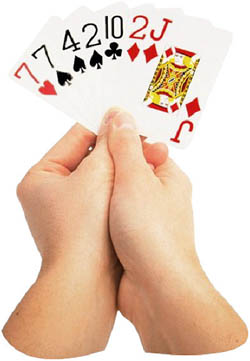 Don't play the regular go fish, but have them ask each other for
cards using mathematical equations.
Don't play the regular go fish, but have them ask each other for
cards using mathematical equations.
This will make them
think about what card the other person wants, as well as what cards
the other players have.
It will force them to remember
mathematical equations using addition, subtraction, multiplication,
and division, and will ensure that their math skills improve.
It can actually turn the game into quite a challenge as you try
to come up with math problems that only the person you are asking
for the card can understand, and it will push your children's minds.
Who said that learning math has to be challenging or complicated
for your child?
Thanks to these cool math games for kids,
your child can learn their math skills as easily as they can pick up
playing the memory game or Go Fish.
Getting them hooked on
these games is actually easier than you might expect, and you can
bet your boots that they will be much more interested in learning
thanks to the fact that you have made it fun for them to do so.
Good luck with teaching your child math using these fun math
activities!

Want to stay in touch and get the latest news?
Sign up
for my free newsletter
Parent Coaching
- For Inner Peace, Clarity and a Deeper Connection to Your Child
 Being a parent can feel like a double-edged sword. Life with kids may feel like the greatest gift you have ever received, while at the same being hugely challenging, often leaving you confused, stressed and overwhelmed.
Being a parent can feel like a double-edged sword. Life with kids may feel like the greatest gift you have ever received, while at the same being hugely challenging, often leaving you confused, stressed and overwhelmed.
When we feel like this, we've lost touch with ourselves. We can't hear our own inner voice, and it's difficult to know what is 'right' for us and how to act.
I offer in-depth parent coaching to help you regain your balance and get back in touch with yourself. From a place of inner peace and clarity, your will find your own answers which will help you reconnect with your child from a place of unconditional love and acceptance.
Read more about my parent coaching here.
Where Would You Like to Go Next?
Fun Math Games for Kids
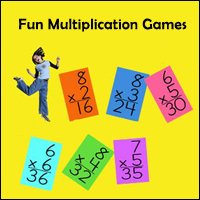 Fun Multiplication Math Games and Educational Times Tables Activities for Kids. |
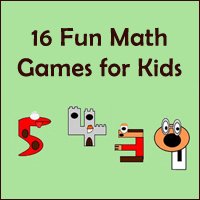 Exciting Math for Kids 16 Fun Math Activities and Counting Games. |
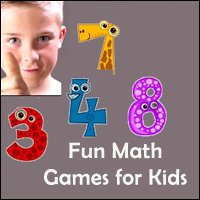 Educational Kids Math Games Cool Math Websites and Physical Fun Math Activities. |
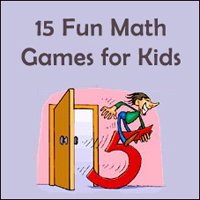 15 Fun Math Games for Kids: Turning Multiplication, Addition and Fraction into Fun Math Activities. |
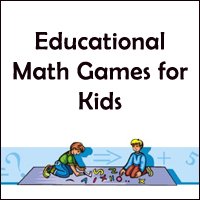 Cool Math Games for Kids and Fun Math Activities for All Ages. |
Fun Science Games and Experiments for Kids
 27 Learning Games for Kids A List of the Best Educational Games for Kids. |
 15 Fun Science Projects for Kids - Fun Learning Games at Home. |
 14 Fun Science Experiments for Kids: Guidelines for Kids Science Projects and Learning Games. |
 14 Science Fair Projects for Kids: Easy Guidelines to Fun Science Fair Ideas. |
 12 Fun Experiments for Kids: Easy Science Projects for Kids to Do at Home or in School. |
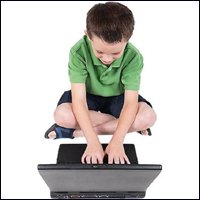 36 Recommended Science Websites for Kids: Science Sites for Kids That Make Learning Fun. |
 Fun Facts about the Solar System for Kids and Fun Kids Astronomy Games. |
Back to the top of this page about 22 Cool Math Games for Kids: Fun Math Activities with Multiplication, Addition and Subtraction
Go to the Positive Parenting Ally Homepage







